Posted: March 6th, 2012 | No Comments »
Apologies I realise that I left out a couple of notable architectural in the old town (Nantao) when compiling my annual What We Lost 2011 list.
And I am indebted to Katya Knyazeva who is an active chronicler of Shanghai, photographer and tour guide leader (details of all her activities/services here). Katya knows far more about Shanghai’s old town than I do. Anyway, she noted these two especially serious losses in the last year:
1. Zhao Mansion; 137 Baiyang Yi Nong. A courtyard residence built in 1917, which had an unusual octagonal terrace on top. Some sources say the original owner was a Cantonese industrialist Deng who had seven concubines and scores of children. After 1949 they all fled Shanghai. A slightly more credible story says the house belonged to a Mr. Zhao who had his furniture workshop in the house. This structure was demolished in March 2011.

Architecturally almost unique…now gone to dust
2. Zhening Huiguan (Zhejiang and Ningbo Merchants Guildhall); 31 Hehuachi Nong. Built in 1859 by the Zhejiang Maritime Bureau (to compete with Siming Gongsuo). According to the descriptions, the guildhall had a large lotus pond flanked by huge carved pillars; the theatre inside was said to be able to house 2,000 spectators. The guild strengthened during the Taiping decade when it was the routing center for all regional grain transportation, but diminished in the 1870’s. In an attempt to turn the declining fortunes the guild sponsored a renovation in 1881. Throughout the 20th century, the hall served as a warehouse, residences and workshops; but had suffered from fire. This autumn, the carcass was finally pulled down. This leaves Shanghai with only one original guildhall left, Shangchuan Huiguan.

Posted: March 5th, 2012 | No Comments »
There is nothing like a nice long signing queue at a book event – so please excuse me while I enjoy the moment – normal service resumed asap:
Adelaide Writers’ Week today:
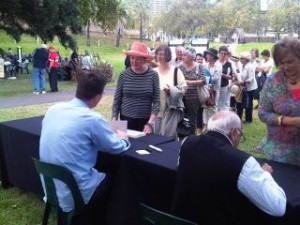
Posted: March 5th, 2012 | No Comments »
from 1940…
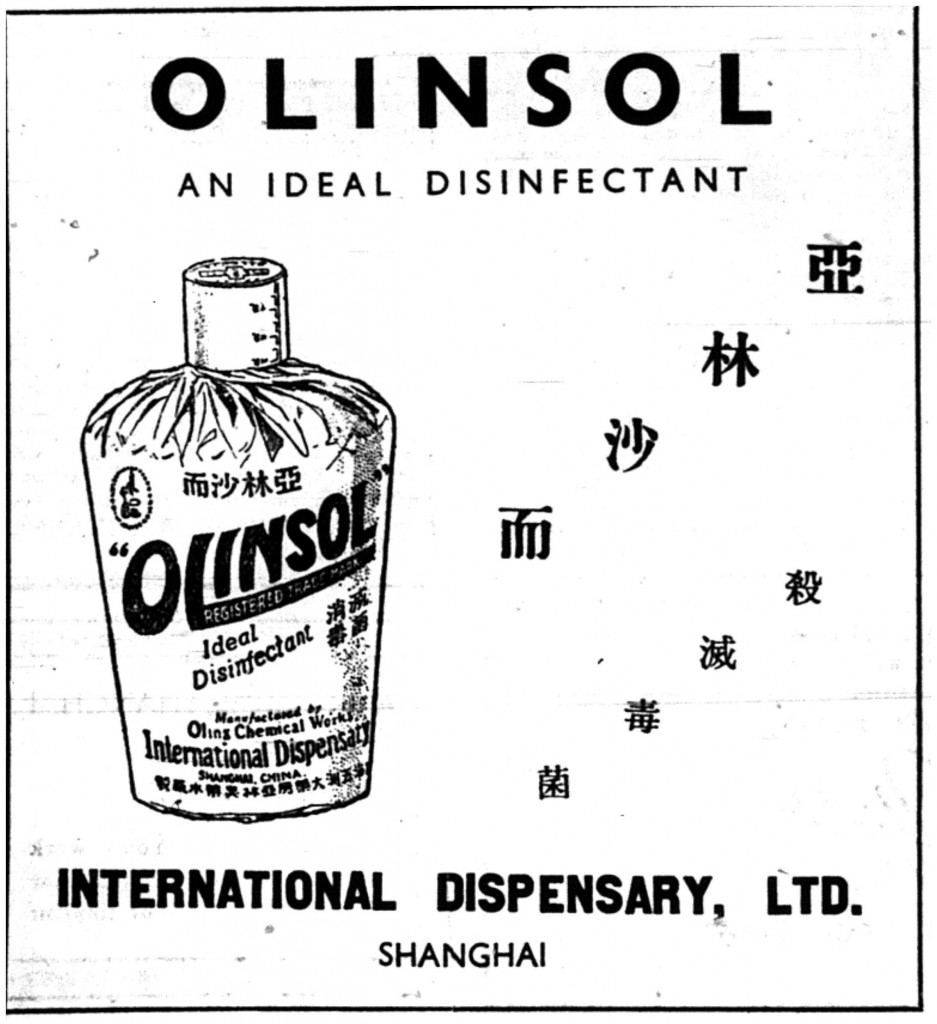
Posted: March 4th, 2012 | No Comments »
The China Hand : Paul French
Adelaide Writers’ Week – Monday, March 5 2012
UK – China
West Stage, 12pm
Paul French has lived and worked in Shanghai for many years. He is a widely published analyst and commentator on China. His recent book, Midnight in Peking, recounts the murder of an English girl in January 1937. In his version, French not only gives his reader an evocative sense of China in the 30s, he also solves the murder. Join him in conversation with Nicholas Jose.
More details here

Posted: March 4th, 2012 | No Comments »
Helen Schneider’s Keeping the Nation’s House looks interesting and original:
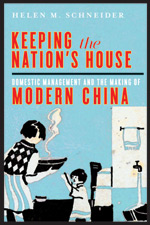
Keeping the Nation’s House unsettles the assumption that home economics training lies far from the seats of power by revealing how elite Chinese women helped to build modern China one family at a time. Trained between the 1920s and the early 1950s, home economists did not believe that a clear line separated the private (nei) from the public (wai). They believed that the home economics courses taught in centres of higher learning would transform the most fundamental of political spaces — the home — by teaching women to nurture ideal families and manage projects of social reform for a strong, modern China. Although their discipline came undone after 1949, it created a legacy of gendered professionalism and reinforced the idea that leaders should shape domestic rituals of the people.
By focusing on the vision and aspirations of the women who shaped a discipline, this book offers a gendered perspective on the past and reveals how women intellectuals dealt with the transition from the Nationalist to the Communist era.
Helen M. Schneider is an assistant professor at Virginia Tech and a research associate at the University of Oxford.
Posted: March 3rd, 2012 | No Comments »
Madame Selina was down on the Rue Massenet (Sinan Road) – i reckon she had a bit of class!
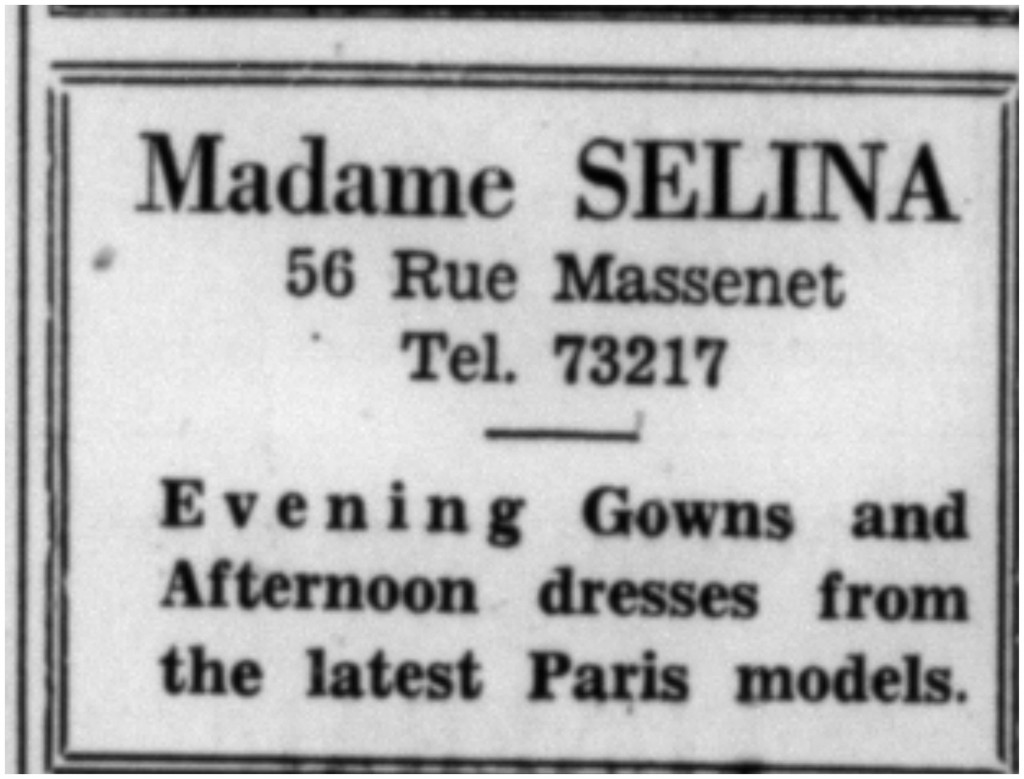
Posted: March 2nd, 2012 | No Comments »
A new book on Eileen Chang from Kam Louie. Details as below.
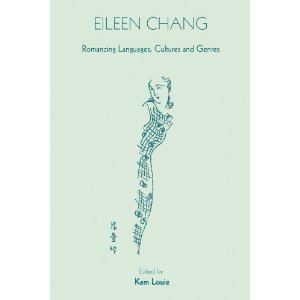
“This unique collection concentrates on Chang’s post-1949 bilingual writings, translations and scholarly research, effectively revising and enriching Chang’s profile as a writer and her role in modern Chinese literary history. While popular reception of Chang is often characterized by either undue adulation or derivation, many papers in this volume provide much needed critical insights and carefully researched analysis, often based on newly revealed sources, touching on issues from Chang’s implication in the Cold-War politics to the ethics of autobiographical writing.” — Yi Zheng, Senior Research Fellow, Department of Chinese Studies, University of Sydney
- Explores Eileen Chang (張愛玲)’s earliest short stories as well as novels that were published posthumously.
– Discusses the translation of her stories for film and stage presentation, as well as nonliterary aspects of her life that are essential for a more comprehensive understanding of her writings.
- Examines the fidelity and betrayals that dominate her alter ego’s relationships with parents and lovers, informed by theories and methodologies from a range of disciplines including literary, historical, gender, and film studies.
Kam Louie is dean of the Faculty of Arts at the University of Hong Kong and author of Theorising Chinese Masculinity, and editor of Hong Kong Culture: Word and Image.
Posted: March 2nd, 2012 | No Comments »
RAS Shanghai LECTURE
Tuesday 6th March 2012 at 7.00pm
Tavern, Radisson Plaza Xingguo Hotel 78 Xing Guo Road, Shanghai
兴国宾馆上海市兴国路78å·
GRETCHEN LIU
ON
ART AND FRIENDSHIP: A SHANGHAI STORY 1925 – 1937

Liu Kang (1911-2004) belonged to a generation of artists who came of age at a time of crisis and upheaval in China. Born in Fujian Province and raised in Malaya, he arrived in Shanghai in 1925 when the city had become the undisputed centre for the study of Western art. His years at the Shanghai Art Academy, as student (1926-28) and teacher (1933-37), coincided with a brief but exhilarating age for art and design in Shanghai. Liu Haisu, the founder of the Shanghai Art Academy, became not only a mentor but also a great friend. Fou Lei, the writer, critic, and translator of the great French novels into Chinese, was another close friend.
In 1933 Liu Kang became the youngest professor hired by the Shanghai Art Academy. In 1937, as Shanghai fell to the Japanese, he left for Malaya, then post World War Two to Singapore where he is venerated as a pioneer artist and one of the founders of the “Nanyang Style” in the 1950s. He continued to paint, teach, write and contribute to the burgeoning art scene. Many of his Shanghai classmates and teachers were far less fortunate in their artistic pursuits. More than 30 years passed before Liu Kang returned to Shanghai and a reunion with Liu Haisu. By then, Shanghai was a very different place and this early chapter in China’s art history was virtually forgotten.
Since the 1980s there has been a resurgence of interest in the art and artists of the 1920s-30s. Research is often difficult as so many original materials have been lost or destroyed. This presentation draws on Liu Kang’s photographs, letters and paintings, telling his story against the larger backdrop of the cultural and social history of Shanghai.
A former journalist, book editor and author with a special interest in architecture, visual heritage and the history of travel, Gretchen Liu is the author of a dozen books on Singapore and its history including the classic A Pictorial History of Singapore 1819-2000 (1999). She was involved in the restoration of Raffles Hotel as curator of the Raffles Hotel Collection and authored several books for the hotel. She continued to work with the Raffles group on their properties in London, Hamburg, Cambodia as well as the Raffles Beijing Hotel. She is married to the architect-urban planner Liu Thai Ker and is the daughter-in-law of Liu Kang. She is currently working on a book that explores Liu Kang’s Shanghai experiences.
Entrance: RMB 30.00 (RAS members) and RMB 80.00 (non-members). Those unable to make the donation but wishing to attend may contact us for exemption, prior to the RAS Lecture. Membership applications and membership renewals will be available at this event.
To RSVP: bookings@royalasiaticsociety.org.cn








